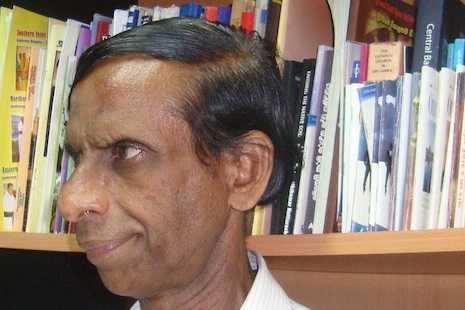
The whole country mourned Rizana Nafeek, the Sri Lankan housemaid who was beheaded in Saudi Arabia on January 9.
Nafeek was sentenced to death in 2007 for killing the four-month-old baby son of her employers.
The housemaid, who was 17 at the time of the baby’s death in 2005, was accused of smothering the boy following a row with the baby’s mother. Nafeek said the baby choked on milk.
The young woman came from a poor Muslim family living in Muttur, Trincomalee, around 280 kilometers northeast of Colombo.
The eldest of five siblings, she went to the Middle East hoping to earn enough money to build a house for her family and to educate her younger sisters and brother.
It has been noted that during her time in custody no lawyer was present to assist her during her interrogation and trial. The question that needs to be asked is, why?
I feel in the first instance that the Sri Lankan embassy in Saudi Arabia or officials in Colombo should have provided her with the required legal assistance. This never happened.
Upon her conviction the government should have filed an appeal on her behalf but refused, citing its policy of non-intervention if Sri Lankan workers face criminal charges abroad. Eventually an appeal was filed in 2008 by the Hong Kong-based Asian Human Rights Commission.
Lawyers defended Nafeek during the appeal. They pointed out that she was a minor at the time of the baby’s death and produced her real birth certificate. They argued the court could not impose capital punishment on her as Saudi Arabia had ratified the United Nations Convention on Child Rights.
The lawyers also argued that Nafeek had not been hired as a nanny but as a general maid and had no prior training in child care. She had been alone while feeding the baby and did not know what to do when the baby started to choke. She said she had cried for help but there was nobody at home.
Nafeek, while testifying at her appeal, said she had signed a confession, written in Arabic which she could not read, under duress and as a result of torture.
At 17, Nafeek was under age when she went to Saudi Arabia using documents faked by employment agents. The state should have immediately prosecuted these agents when this fact came to light. Instead the agents were arrested three years later and received two-year prison terms and ordered to pay fines.
From 2010 to 2012, there was ample time for the government to negotiate with Saudi Arabia and the aggrieved family, but it did very little. The state president requested a pardon for Nafeek from the Saudi King on September 2012, which was rejected.
All this could have been avoided if the government had taken steps to help safeguard the interests of migrant workers. In Nafeek’s case the government also showed a lack of will to help her and seemed out of touch with what was going on.
On the day Nafeek was executed, the minister in charge of foreign employment stated in parliament that she was to be released soon. However just an hour later, news of her execution was revealed to parliament by an opposition member.
More must be done in future to prevent similar tragedies from occurring. Nearly 1.7 million Sri Lankans are employed abroad and the US$6 billion they sent home last year is a key source of income for the government.
This young girl was one of a large army of women who make enormous sacrifices to assist their families. They deserve more than the extremely inadequate services provided by our diplomatic missions in times of need.
There is no proper coordination between employers and the Sri Lankan Foreign Employment Bureau, which is supposed to look after the welfare of migrant workers through job agencies and diplomatic missions.
Deployment of unskilled people for domestic work should be stopped because they are most at risk from exploitation and abuse. Only skilled workers in health, hospitality and sales industries should be encouraged to go abroad.
Expatriate workers’ safety should be paramount to the government. Unfortunately there are too many case workers returning to Sri Lanka as victims of abuse, especially in the Middle East.
Some return with nails or other metal objects hammered into their body, others with burn injuries. Some have been sexually abused and beaten by their employers. Others like Nafeek return home in coffins.
The government must monitor and regulate employment agencies more effectively since many freely adopted illegal practices when sending workers abroad.
When they go abroad, better protection is urgently needed since many workers end up working in conditions that could be described as modern slavery.
Parliament observed a minute’s silence the day Nafeek was executed. It would do better now to respect all expatriate workers, and devise an urgent plan of action to prevent similar tragedies from happening again.
Don Kingsley Karunaratne is theadministrative secretary of the Rule of Law Forum which is affiliated to the Asian Human Rights Commission in Hong Kong


